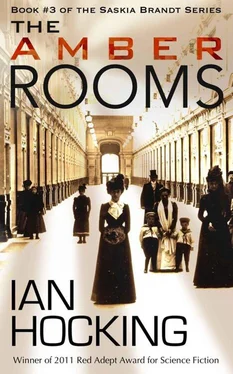The room flashed white.
Saskia withdrew her mouth. A gossamer of spit strung between their mouths for a moment, then was gone. A couple, their arms linked, were standing beneath the arch and looking at Kamo, who had leaned backwards, as though he were trying to brace the wall. The bluish cast to his lips was purpling, returning to red.
Saskia stepped from behind the arch and apologised to the couple. The gentleman asked her, curtly, if she was a feature of the background. Saskia smiled. She slipped from the room with a last nod to the photographer, who was still holding his L-shaped flash-lamp aloft. She walked with studied confidence. In all the mirrors, all the polished surfaces, and the half-bright crowds in the windows, she looked for the man towards whom the compass of Kamo’s mind pointed, like a false north: the poet Soselo.
The size of the Grand Ballroom was emphasised by gilded mirrors between its double tier of windows. Saskia judged physical spaces in terms of their capacity for exploitation: attack, distraction, concealment. As she stepped onto the parquet floor, she understood that it would take more than eight seconds to sprint its length, though on this evening it was crammed with guests. Only six of the dozen chandeliers had been burned. The great windows to the west looked across the torchlit palace square, while those to the east had a view of the gardens. It felt as airy as a quadrangle despite the thunderous scenes painted on the ceiling. Soon, midnight would pass through this room. An orchestra played a rich, soaring piece. Saskia had entered the ballroom at the finale to a quadrille. The guests froze, then bowed as the music completed. There was a sizeable audience about the periphery and their applause echoed. A man wearing a blue fountain of peacock feathers—the nominated dance master—approached the conductor and made a circular motion with his hand: keep going.
In the moment before the music returned, Saskia looked round. She saw Kamo stagger into the room. His appearance drew smiles and shakes of the head. He seemed the worse for drink. Saskia look ahead, towards the main staircase, and saw the same greenish glow that had captured her attention upon entering the Summer Palace. Then a reveller passed through her sightline and the green shine, or whatever produced it, had disappeared.
A Strauss waltz commenced. At once, there was general movement towards the dance floor, like a flower closing. Tension had been released. Saskia felt bodies carry her forward. Ladies laughed and men laughed along with them. Couples formed and spun. The whirlpool carried Saskia anticlockwise. As ever, her height made her conspicuous, and her blackcurrant pelisse billowed as she turned, tracking Kamo.
‘May I?’ asked a man.
‘With pleasure.’
She danced, but kept her left wrist held within her warmer. This seemed to please her dance partner, and the two waltzed without touching. The man kept his hands behind his back. Saskia, in deference to his politeness, made sure that their synchrony was absolute. Nearby dancers saw them and, laughing, adopted their remote style. But the dancers could not match Saskia for her ability to anticipate.
‘The piece is ending,’ she said.
‘Where may I take you?’
‘The far end of the floor, towards the staircase.’
They spun and spun. In the turns, Saskia saw Kamo as he struggled to follow her through a thickening of the audience near the orchestra. Saskia’s dance partner did not follow her glance. He only looked at Saskia and, on occasion, those around him.
‘How can I not have seen you before, in society? You are the most beautiful woman here.’
‘I’m wearing a mask.’
‘The mask hides nothing, says the proverb. But here we are.’
The man bowed. He wanted to kiss her glove, as was the custom, but Saskia did not offer it. So his smile was crooked as he reversed into the slow storm of dancers. Saskia nodded to him, then moved on. She was at the far wall of the Great Ballroom. Through the open door, she could see seven rooms of the enfilade. But she did not step through.
She approached a short, nervous-looking man who had been observing her. His pocket watch, which dangled carelessly outside its pocket, had the greenish glow of radium. She confiscated his wine glass.
~
‘You’re not old enough to drink this,’ she said.
Pavel Eduardovitch Nakhimov smiled beneath his Nosey Parker mask and bowed. In the mirror behind him, Saskia saw Kamo shouldering a path through the crowd. She thought of threatening him with the grenade, but knew the bluff would not work.
‘I’m seventeen today.’
‘Many happy returns,’ she said sourly. She drank the wine.
She passed the glass to a footman, who appeared and disappeared for the purpose. ‘We have about fifteen seconds before my friend reaches us. When he does, he will probably try to kill you. Happy?’
‘Of course,’ Pasha replied. His words were slow. ‘It’s my birthday and you’re here.’
‘How did you know?’
‘When we parted, I made sure to touch the band and listen for the countdown. Zero is tonight, at midnight. My father told me of your interest in the Amber Room.’
‘And the pocket watch?’
‘You can see it, can’t you? Like you saw me in the dark?’
‘Pavel Eduardovitch, you would be conspicuous enough without it. Gump teaches us that clever is as clever does.’
Saskia looked into the mirror. Kamo’s journey across the dance floor was drawing consternation, particularly from the gentlemen. ‘Pasha, I have been beaten only once at chess, because I cheat. At any given moment in the game, I calculate many possible board states, starting with the most probable. The man who beat me employed an irrational, unpredictable move.’
‘I don’t understand.’
‘You, my dear boy, are the unpredictable move. You have complicated my evening beyond my powers to predict its next iteration.’ She touched his cheek. ‘You cannot have me. You may not even have your life.’
Pasha straightened his back. ‘I will protect you.’
‘It’s too late. Pavel Eduardovitch, my name is Saskia Maria Brandt. Say it, please, so that I know you heard it.’
‘Saskia Maria Brandt.’
Kamo pushed between them. His right hand was still on his heart and his eyes were narrow with pain. But he showed them his left hand, which held a palm pistol. Its barrel protruded between his second and third fingers. He pointed it at Pasha.
Quietly, he said to Saskia, ‘Give me the apple.’
‘Take it yourself.’
‘No. Place it within my jacket. Inside, right pocket. Don’t try anything.’
Pasha shook his head. She moved until she was shoulder-to-shoulder with Kamo, their backs to the crowd, and placed the grenade inside his jacket.
Kamo said, ‘Do you recognise me, boy?’
‘You’re the man with the spoilt eye. But I would smell you anyway. If you hurt Saskia, I’ll kill you.’
Kamo laughed. ‘Not everything is as easy as jumping from a window.’
‘Then perhaps I’ll throw you through one.’
‘A poor response. Look at this, Little Hero.’
Kamo put his gun to Saskia’s ribs. With his free arm, he pulled her close. Saskia felt the muscles in her abdomen quiver. It was not beyond Kamo to shoot. The report would be no louder than glass breaking on the carpet. Gutshot with a small-calibre bullet, Saskia would be more amenable.
‘As long as you both cooperate,’ said Kamo, ‘you will come to no harm. Let us proceed directly.’
The three of them moved through the open doorway into a silvered dining room hung with streamers. Guests either stood or were seated at one of the three tables. Every few steps, Pasha looked back at them. In his eyes, Saskia saw Pasha’s wonder that she did not despatch Kamo with a high kick, knocking the sense from his head just she had knocked the cigarette from the his own mouth on the second day of their acquaintance. Indeed, she had been capable moments ago. She thought once more of the long kiss behind the photographer’s arch. She remembered the desperate suction and his failing, darkening blood. The magnesium flash. Now, with Pasha here, and the eyes of the crowd, she had lost it. Beneath the curve of Kamo’s collar were pipes bearing blood and air. She could throttle them using the wires along her forearm, which would mean death by an Allegory of the Future.
Читать дальше












